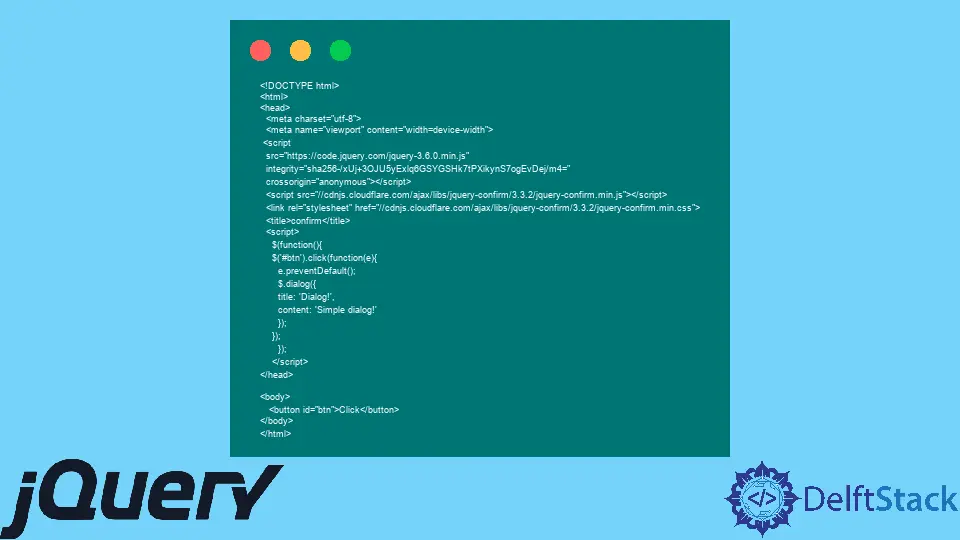jQuery Confirm Plugin
-
Use of jQuery
.$alertto Ensure Confirmation -
Use of jQuery
$.dialogto Ensure Confirmation -
Use of jQuery
$.confirmto Verify Confirmation

In jQuery, the confirm plug-in comprises a function similar to the JavaScript confirm function. But the basic distinctive characteristic is that the jQuery $.confirm has some properties (including OK and Cancel buttons) which can be altered as a preference, while the JavaScript confirm is rigid, and the minimal buttons cannot be changed.
So, in other words, jQuery does get the spotlight for being more flexible. The task of confirming can be implemented by JavaScript, jQuery confirm plug-in and jQuery dialog UI.
We will only focus on the solution based on the jQuery confirm plug-in.
To enable the plug-in on your local PC, you can depend on the CDNs, or you might install the package via npm. This portal can be a proper user guide for you.
In our example sets, we will use the CDNs for versatile use cases and examination.
Use of jQuery .$alert to Ensure Confirmation
According to basic differentiation between alert, dialog, and confirm actions, the alert comes with one single button, OK. In contrast, the dialog previews a basic modal with customized content and title values.
So, let’s visualize the alert type confirmation.
Code Snippet:
<!DOCTYPE html>
<html>
<head>
<meta charset="utf-8">
<meta name="viewport" content="width=device-width">
<script
src="https://code.jquery.com/jquery-3.6.0.min.js"
integrity="sha256-/xUj+3OJU5yExlq6GSYGSHk7tPXikynS7ogEvDej/m4="
crossorigin="anonymous"></script>
<script src="//cdnjs.cloudflare.com/ajax/libs/jquery-confirm/3.3.2/jquery-confirm.min.js"></script>
<link rel="stylesheet" href="//cdnjs.cloudflare.com/ajax/libs/jquery-confirm/3.3.2/jquery-confirm.min.css">
<title>confirm</title>
<script>
$(function(){
$('#btn').click(function(e){
e.preventDefault();
$.alert({
title: 'Alert!',
content: 'Simple alert!'
});
});
});
</script>
</head>
<body>
<button id="btn">Click</button>
</body>
</html>
Output:

Use of jQuery $.dialog to Ensure Confirmation
We will see the basic template of the dialog action and alter the title and content of it. As dialog does not have any buttons, all it does is show a message of preference.
It has a cross (x) button in the upper-right corner to return to the main contents.
Code Snippet:
<!DOCTYPE html>
<html>
<head>
<meta charset="utf-8">
<meta name="viewport" content="width=device-width">
<script
src="https://code.jquery.com/jquery-3.6.0.min.js"
integrity="sha256-/xUj+3OJU5yExlq6GSYGSHk7tPXikynS7ogEvDej/m4="
crossorigin="anonymous"></script>
<script src="//cdnjs.cloudflare.com/ajax/libs/jquery-confirm/3.3.2/jquery-confirm.min.js"></script>
<link rel="stylesheet" href="//cdnjs.cloudflare.com/ajax/libs/jquery-confirm/3.3.2/jquery-confirm.min.css">
<title>confirm</title>
<script>
$(function(){
$('#btn').click(function(e){
e.preventDefault();
$.dialog({
title: 'Dialog!',
content: 'Simple dialog!'
});
});
});
</script>
</head>
<body>
<button id="btn">Click</button>
</body>
</html>
Output:

Use of jQuery $.confirm to Verify Confirmation
In this regard, we will have two button options. By default, for every confirm action, the texts are OK and Cancel.
However, here we have the privilege to alter these texts. Also, some other parameters can be manipulated.
The link in the introduction can let you through the latest list. Let’s check our example for a better view of the task.
Code Snippet:
<!DOCTYPE html>
<html>
<head>
<meta charset="utf-8">
<meta name="viewport" content="width=device-width">
<script
src="https://code.jquery.com/jquery-3.6.0.min.js"
integrity="sha256-/xUj+3OJU5yExlq6GSYGSHk7tPXikynS7ogEvDej/m4="
crossorigin="anonymous"></script>
<script src="//cdnjs.cloudflare.com/ajax/libs/jquery-confirm/3.3.2/jquery-confirm.min.js"></script>
<link rel="stylesheet" href="//cdnjs.cloudflare.com/ajax/libs/jquery-confirm/3.3.2/jquery-confirm.min.css">
<title>confirm</title>
<script>
$(function(){
var ask = true;
$('#btn').click(function(e){
if(ask){
e.preventDefault();
$.confirm({
title: "Delete",
content: "You sure?",
buttons: {
confirm: {
text: "Yes",
action: function(){
ask = false;
alert("Deleted.");
}
},
cancel: {
text: "No"
}
}
});
}
});
});
</script>
</head>
<body>
<button id="btn">Click</button>
</body>
</html>
Output:

One fact to focus is, all the functions $.alert(), $.confirm(), and $.dialog() are part of the jconfirm() function. All of them are interchangeably used based on the use case.
Also, we have used the CDNs for jQuery minified js, jquery-confirm minified js, and jquery-confirm minified css. Make sure to check on the versions and later updates while taking the examples as references.
